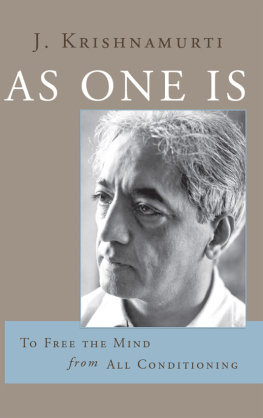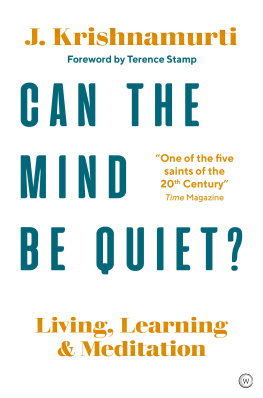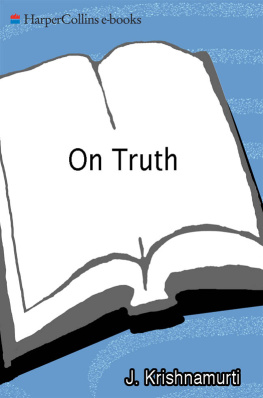Krishnamurti - The Nature of the New Mind
Here you can read online Krishnamurti - The Nature of the New Mind full text of the book (entire story) in english for free. Download pdf and epub, get meaning, cover and reviews about this ebook. publisher: Krishnamurti Foundation India, genre: Religion. Description of the work, (preface) as well as reviews are available. Best literature library LitArk.com created for fans of good reading and offers a wide selection of genres:
Romance novel
Science fiction
Adventure
Detective
Science
History
Home and family
Prose
Art
Politics
Computer
Non-fiction
Religion
Business
Children
Humor
Choose a favorite category and find really read worthwhile books. Enjoy immersion in the world of imagination, feel the emotions of the characters or learn something new for yourself, make an fascinating discovery.

- Book:The Nature of the New Mind
- Author:
- Publisher:Krishnamurti Foundation India
- Genre:
- Rating:5 / 5
- Favourites:Add to favourites
- Your mark:
- 100
- 1
- 2
- 3
- 4
- 5
The Nature of the New Mind: summary, description and annotation
We offer to read an annotation, description, summary or preface (depends on what the author of the book "The Nature of the New Mind" wrote himself). If you haven't found the necessary information about the book — write in the comments, we will try to find it.
The Nature of the New Mind — read online for free the complete book (whole text) full work
Below is the text of the book, divided by pages. System saving the place of the last page read, allows you to conveniently read the book "The Nature of the New Mind" online for free, without having to search again every time where you left off. Put a bookmark, and you can go to the page where you finished reading at any time.
Font size:
Interval:
Bookmark:
The Nature of the New Mind
Copyright 2001 Krishnamurti Foundation of America & Krishnamurti Foundation Trust Ltd.
The Nature
of the
New Mind
J. Krishnamurti
K RISHNAMURTI F OUNDATION I NDIA
Contents
TALKS 1961
TALKS 1962
TALKS 1964
TALKS 1965
TALKS 1966
TALKS 1967
TALKS 1968
Publishers Note
This book is one of a series titled Selections from the Decades. The series aims at presenting a representative sample of public talks that Krishnamurti gave between the 1940s and the 1980s. Each volume focuses on the talks given during a decade or a part of it in different parts of the world. The series begins with Krishnamurtis talks in India in 1947, a year that marked a milestone both in Indias destiny and in the unfoldment of Krishnamurtis teachings.
The intention behind putting together such a series is to give the reader an overview of how the teachings expressed themselves over a period of time and in a particular context and in a particular idiom. The series also shows how Krishnamurti responded to the different challenges posed by a rapidly changing society. Krishnamurti (1895-1986) lived through the most tumultuous part of a century that saw two world wars, the splitting of the atom, the breakdown of ideologies, the savage destruction of the earth and the degeneration of every aspect of human life. It was also a century that could claim phenomenal progress in various technological fields. Krishnamurtis prophetic vision warned us of coming events far ahead of time. Decades before we became aware of the peril to the planet, he was already exhorting children at school to take care of the earth, to tread lightly on it. By the 1970s he was to ask: What will happen to the human being when the computer takes over all the functions of the brain?
Again we notice in the talks that the concerns expressed and the questions put to him in the 1980s were quite different from those of the 1940s and 1950s. What is striking about Krishnamurtis approach, however, is that even while addressing the social, political and economic issues of the period, his answers are rooted in a timeless vision of life and truth. He shows how behind any problem lies the creator of the problem and how the source of fragmentation lies within the mind of man. He offers no ready-made solutions to contemporary issues, for he sees clearly that they are but symptoms of a deeper malaise that lies embedded in the mind and heart of each human being.
Krishnamurtis statements are those of a seer, not of a social reformer. As such they are completely free of stereotype or clich. Krishnamurti displays a remarkable resilience in adapting his approach and idiom to the state of the mind of the questioner so that his answers are always fresh and original. Each talk is a new experience for the audience or the reader as it takes one through an inward journey of self-discovery.
Questioned as to whether his teachings had changed over the decades, Krishnamurti was to say: No. There have been changes in expression, changes in vocabulary, changes in language and gestureyou know all thatbut there has been no fundamental change from the beginning till now. (Fire in the Mind p. 16).
Krishnamurti Foundation India feels happy to offer these series of powerful talks to its readers, many of whom might be coming upon them for the first time.
TALKS 1961
Bombay
19 February
We see throughout the world a dreadful and frightening chaos. Everywhere people are one against another, not only individually, but racially, communally, as a country, as a group, or as a race. Nationalism is rampant, increasing. The margin of freedom is very small, not only for the individual, but also for the community, for the mind. Religions are dividing people; they are not the unifying factor at all. And there is the increase of tyranny, either of the left or of the right. There are various forms of religions, sectsinnumerable, in thousandsall over the world saying that they have the real stuff. Religious tyranny is equally abhorrent to a mind that is really seeking what is truth, as is political tyranny, and both are on the increase. Catholicism, with its dogma, with its creeds, with its excommunications, and all the rest of it, is on the move, is spreading; so is communism also on the increase, with its excommunications, liquidations, and denials of human rights, thoughts, and freedom, spreading poverty, squalor, chaos. In fact, the house is burning, and literally burning; and there remains only the final explosion, which is the atomic bomb. All this we know in a minor or major degree.
Every individual not only has the feeling that something must be done to see the problem, not merely intellectually, but also feels the inward necessity of an urgent response to the whole total issue. When one does not feel the total issue, one goes about reforming socially, reviving the old religions, going back to the Upanishads, the Gita, or to some ancient thought, or following some leader who promises more. There is the feeling that, as one cannot do it by oneself, one must leave it to somebody elseto the guru, to the political leader. And there is reform in patches: giving land, appeasing, pacifying, coexisting, twisting words to mean different things apart from the direct meaning in the dictionary, to suit ones own or ones partys ideological intentions. Sir, there is corruption, there is misery, there is increasing industrialization all over the world, and industrialization without revolution only leads to mediocrity and greater suffering.
A revolution of a different kind is necessarythat is what I want to discuss; that is what I want to go into. But I think one must see the utter futility of religious organizations completely, the absurdity of those organizations and of merely following a certain idea, a certain plan for the salvation of man. To a mind that is seeking truth, a religious leader has no meaning any more. I do not know how you feel about all this but, watching, going about, wandering about in the land, there is this sense of appalling death of human integrity because we have handed over ourselves politically to a party or parties, or religiously to books, or to the latest saint who wanders about in a loincloth with his particular social, political, or religious panacea, appeasing, pacifying. I do not think I am exaggerating what is actually taking place, not only in this unfortunate country, but also in the rest of the world.
Now, you know this. I have only described what is a fact. A mind that gives an opinion about a fact is a narrow, limited, destructive mind. You understand, sir? Let me explain a little bit further. This is a factwhat is actually taking place in the worldand you and I know it very well. You can translate the fact in one way, and I can translate it in another way. The translation of the fact is a curse which prevents us from seeing the actual fact and doing something about the fact. When you and I discuss our opinions about the fact, nothing is done about the fact. You can add perhaps more to the fact, see more nuances, implications, significance about the fact, and I may see less significance in the fact, but the fact cannot be interpreted: I cannot offer an opinion about the fact. It is so, and it is very difficult for a mind to accept the fact. We are always translating, we are always giving different meanings to it according to our prejudices, conditionings, hopes, fears, and all the rest of it. If you and I could see the fact without offering an opinion, interpreting, giving a significance, then the fact becomes much more alivenot more alivethe fact is there, alone; nothing else matters; then the fact has its own energy which drives you in the right direction. Opinions drive us, conclusions drive us, but they drive us away from the fact. But if we remain with the fact, then the fact has its own energy which drives each one of us in the right direction.
Next pageFont size:
Interval:
Bookmark:
Similar books «The Nature of the New Mind»
Look at similar books to The Nature of the New Mind. We have selected literature similar in name and meaning in the hope of providing readers with more options to find new, interesting, not yet read works.
Discussion, reviews of the book The Nature of the New Mind and just readers' own opinions. Leave your comments, write what you think about the work, its meaning or the main characters. Specify what exactly you liked and what you didn't like, and why you think so.








